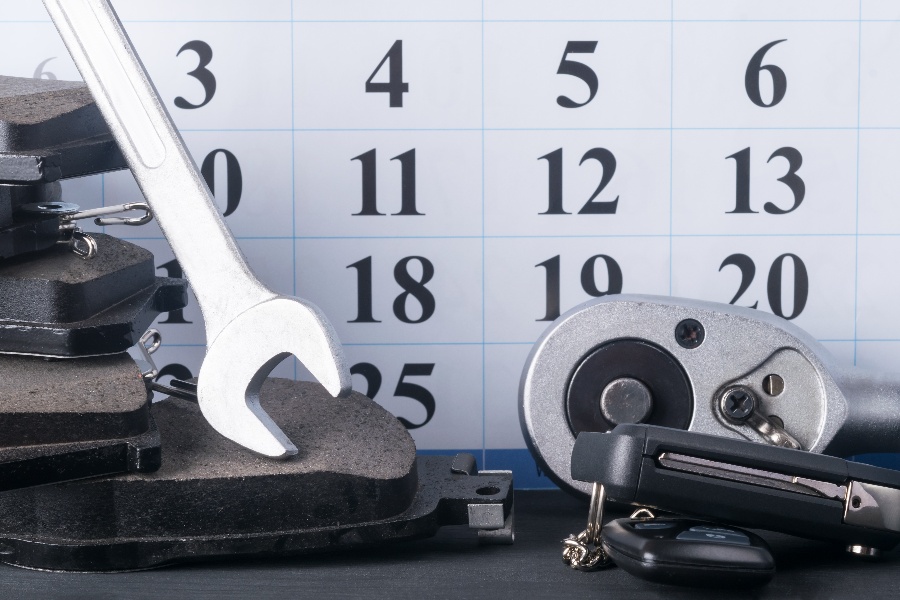
As a rule, good business owners and fleet managers hate waste. You don't toss out a perfectly good desk or printer because it's seen a few years, and you wouldn't toss out a good car if it still runs.
This is a common mentality among fleet managers, especially those that take pride in their high standard of maintenance and care for each vehicle. However, this mentality can also get in the way of optimizing your fleet strategy for both budget and performance efficiency.
Fleet managers who maintain older vehicles often overlook the cost of operating an older fleet. In reality, the most efficient plan is a vehicle replacement schedule that allows you to both strategize your long-term budget and regularly update your vehicle inventory. Let's dive into the practical reasons to build a vehicle replacement schedule, and when maintaining older fleet vehicles is no longer your best bet.
The Costs of Operating an Older Fleet
How much does it cost to perform yearly maintenance on each of the vehicles in your fleet? This is an important stat to keep track of, as it can reveal when some of your vehicles have gone "over the hill" in terms of maintenance efficiency. As cars get older, the internal parts age and need a more rapid pace of replacements and repairs. Ten-year-old vehicles can cost anywhere from double to ten times more than they did in their third year of performance. At some point, you would save more on a new vehicle than maintaining the old.
There are also fleet-wide costs to consider when one of your older vehicles is down for repairs. If you were relying on that vehicle to complete a route, the entire fleet is short and customers may even see delays and cancellations as a result. While your mechanic team may be ace at getting those old cars back on the road, you still lose time and money with each repair.
Making a Strong Impression with an Impressive Fleet
Next, there's the good impression factor. If your fleet needs to look sharp and professional - as most fleets do - then older vehicles are eventually doing you a disservice. Even well-maintained, eventually repairs begin to show through and customers can tell you're rolling out in older vehicles. A vehicle that looks like its seen better days, unfortunately, does not effectively reflect the repairability and tenacity of a team. To customers, it can appear more than your fleet can't afford to stay current.
While this may be a symptom of the disposable product economy, impressing customers is still a top priority for your brand's reputation and customer confidence in your team.
Maintaining Budget Predictability
Then there's keeping your budget clean and predictable. Fleet managers like a budget that stays the same every year, and nearly the same every month. You can optimize your fuel costs by knowing almost exactly how much gas is needed for each route. You can predict the general monthly and annual maintenance cost of each vehicle down to the oil change and filter replacement. But older cars throw off the balance.
As vehicles age and parts need replacing, these repairs can go outside your calculations. On the other hand, budgeting for a new vehicle and trade-in is a predictable financial choice you can make in both the long- and medium-term. With a vehicle replacement schedule, you can both predict the reliable maintenance needs of new and moderately new cars along with the predictable periodic cost of replacing an older model before it becomes costly.
Replaced Vehicles Are Never Wasted
Last but not least, it's important to remember that a replaced vehicle is never wasted. We know you take pride in keeping good vehicles running for as long as possible. But you're not sending your replaced vehicles to the landfill. In most cases, you will be trading them into a dealer or fleet broker. From there, older vehicles can be resold or recycled.
Vehicles in good condition are resold as used to new owners who benefit from your meticulous fleet maintenance and care. Vehicles beyond practical maintenance are recycled. The rarest and best-maintained parts can be saved for future repairs of similar models while the mass of plastic and metal are used again to manufacture new products.
Rebalancing Fleet Costs with a Strategic Vehicle Replacement Schedule
If you've been holding on to older vehicles in your fleet, it's time to recalculate and rebalance your costs. The right fleet replacement schedule (specific to each make and model) can ensure that you never keep a vehicle longer than its balanced affordability to replace. In other words, vehicles will stay in your fleet until it becomes more cost-effective to replace than to maintain. Your finances stay predictable and your fleet stays up-to-date with the latest models and features.
To build a custom vehicle replacement schedule for your fleet, contact us today.








